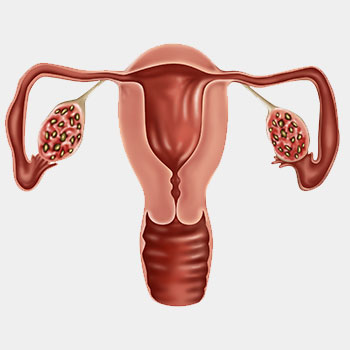PCOS
Polycystic Ovary SyndromePolycystic ovary syndrome (also known as polycystic ovarian syndrome – PCOS) is a complicated hormonal condition. The term 'polycystic' literally means 'many cysts.' This relates to the ovaries' many partially developed follicles, each of which contains an egg. These are rarely mature or produce eggs that can be fertilised.
What Do Hormones have to do with PCOS?
The condition polycystic ovary syndrome (PCOS) impacts a woman's hormone levels. Women with PCOS produce more male hormones than usual. This hormonal imbalance causes their bodies to skip menstrual periods, making it more difficult for them to become pregnant.
What are the Symptoms of PCOS?
Women with PCOS may experience the following symptoms:
- Menstrual cycles that are irregular – periods that are less frequent or more frequent as a result of less frequent ovulation (release of an egg)
- amenorrhoea (absence of menstruation) – some women with PCOS do not menstruate, sometimes for many years.
- Reduced fertility (difficulty getting pregnant) – caused by irregular or absent ovulation.
- Anxiety and depression are examples of mood changes.
- obesity
- obstructive sleep apnea
- excessive hair growth on the face or body (or both)
- acne
- hair loss on the scalp
PCOS does not necessitate the presence of all of these symptoms.
What are the causes of PCOS?
Although the exact cause of PCOS is unknown, it frequently runs in families.
It is linked to abnormal hormone levels in the body, including high insulin levels. Insulin is a hormone that regulates blood sugar levels.
Many women with PCOS are resistant to the action of insulin in their bodies and produce more insulin to compensate.
This contributes to increased hormone production and activity, such as testosterone.
Being overweight or obese causes your body to produce more insulin.
What Complications can PCOS be linked with?
PCOS has been linked to the following complications:
- Insulin resistance
- Diabetes is more likely to develop in women, especially if they are overweight.
- Abnormalities in cholesterol and blood fats
- coronary heart disease (heart disease, heart attack and stroke).
- cancer of the endometrium

How is PCOS diagnosed?
PCOS diagnosis is likely to include:
- your medical background
- a thorough examination
- Hormone levels in the blood using blood tests.
- Other tests, such as a pelvic ultrasound, may be performed as needed.
Early diagnosis is critical for symptom management and may prevent the development of long-term health problems such as diabetes.
How is PCOS treated?
To avoid associated health problems, it is critical that all PCOS symptoms are addressed and managed on a long-term basis. PCOS is a chronic condition that requires long-term management.
PCOS management can include the following, depending on the symptoms you are experiencing:
- Lifestyle changes, such as boosting your physical activity and eating a healthy diet, can help you manage PCOS.
- Weight loss if obese – studies have shown that even a 5% to 10% weight loss can provide significant health benefits.
- Medical treatment – such as hormone replacement therapy or medication.
Lifestyle Changes
Lifestyle changes, such as eating a healthy, balanced diet and incorporating regular physical activity into your routine, can benefit your health in a variety of ways. A healthy lifestyle can help women with PCOS improve their symptoms, especially if they are overweight and your new lifestyle helps them lose weight.
Weight Loss
You don't even need to lose a lot of weight to reap the benefits. According to research, if you are overweight, a five to ten percent weight loss can:
- restore normal hormone production – which can aid in period regulation and fertility enhancement
- raise one's mood
- decrease symptoms such as : *Hair growth on the face and body *Hair loss on the scalp *Acne.
It may also lower your chances of developing type 2 diabetes and cardiovascular disease.
Medical Treatments:
Medical treatments for PCOS include the following:
- the oral contraceptive pill – this is frequently prescribed for contraception, to regulate the menstrual cycle, to reduce excess hair growth and acne, and to keep the womb lining from thickening excessively.
- Medication that inhibits hormones like testosterone (for example, spironolactone) – these may be used to reduce excess hair growth or scalp hair loss.
- Insulin sensitising medications – these will help people with insulin resistance and may be useful for regulating menstrual cycles, improving ovulation (egg production) and fertility, avoiding diabetes progression, and possibly assisting with weight loss.
- If infertility is a problem, clomiphene citrate (sold as Clomid) or aromatase inhibitors can be taken orally to induce ovulation (egg production)
- Psychological help is available.
Your doctor and specialists can talk about different treatments with you to help you decide which one is best for you.
#MakeAMove for PCOS
September is PCOS awareness month 1 in 10 womwn in the UK have PCOS
Challenge yourself to get moving the September and help raise awareness of PCOS
Ways to get moving:
Do a 30day Yoga ChallengeSet yourself a daily step goal
Set yourself a distance goal for the month
Dance in your front room for 10 minutes every day
Take advantage of opportunistic activity
- Take the stairs
- Park further away
- Walk to the shops instead of driving
- Sit less, move more

What is PCOD?
Polycystic Ovarian Syndrome is the most common endocrine disorder in females. The cause of PCOD is unknown, but doctors believe that an increased level of androgen harmone and insulin might induce the disease. PCOD affects women of all ages, from adoloscence to post-menopausal.
Learn further about : Top 10 gynecologist in Chennai
Common Symptoms of PCOD
- Excessivr facial hair (hirsutism)
- Irregular, Heavy or absent periods
- Weight gain or difficulty losing weight
- Acne or oliy skin
Best PCOD Excercises

HIIT
High-intensity interval training can help increase insulin sensitivity, so it can be great for women with PCOS. HIIT is a form of interval training with short periods of intense exercise followed by a rest period.

Strength Training
Strength training can improve insulin sensitivity. You cannot get "buff" with strength training - you will grow muscle and burn fat at the same time.

Jogging
Moderate exercise like jogging or just brisk walking will speed up your metabolism, help you burn fat, and increase natural insulin sensitivity.

Yoga
One of the best and least expensive exercises for PCOS is yoga! It will keep you healthy and refreshed and deep breathing will help relieve stress.
Study in depth : Fertility centre in omr, Best gynecologist doctor in Chennai

